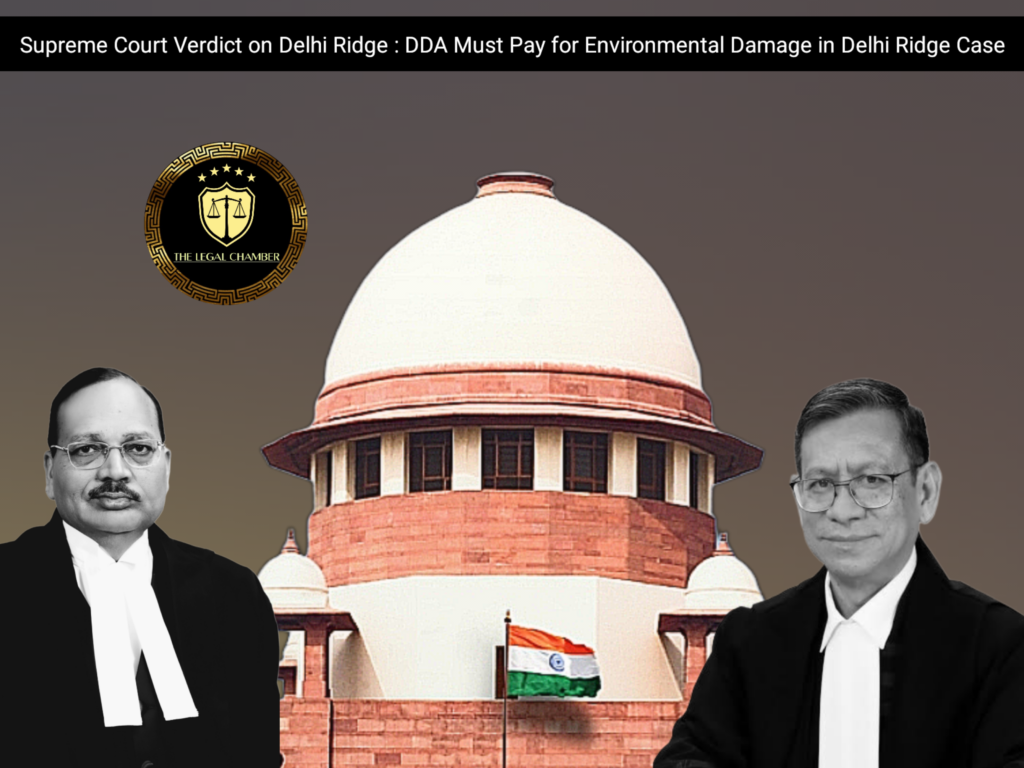
The Supreme Court held the Delhi Development Authority (DDA) in contempt for wilfully disobeying its 1996 order prohibiting tree felling in the Delhi Ridge and for concealing this action from the court. The Court emphasized that such conduct obstructs the administration of justice and undermines the Rule of Law, necessitating remedial measures to purge the contempt.
Facts Of The Case:
This contempt petition before the Supreme Court of India stems from the Delhi Development Authority’s (DDA) alleged wilful disobedience of the Court’s 1996 order in M.C. Mehta v. Union of India, which mandated the preservation of the ecologically sensitive Delhi Ridge. The DDA sought approval for constructing approach roads to the Central Armed Police Forces Institute of Medical Sciences (CAPFIMS), entailing the felling of approximately 1,051 trees. While the Central Empowered Committee (CEC) recommended approval subject to various conditions, including obtaining statutory clearances, the DDA commenced tree felling in February 2024 without awaiting the Supreme Court’s permission or securing all requisite clearances under environmental laws.Upon discovery, a contempt petition was filed. The Court dismissed DDA’s initial applications for felling due to vagueness and subsequently initiated suo motu criminal contempt proceedings, expressing serious concern over the unauthorized felling of over 1,100 trees and the concealment of facts by DDA officials. An independent committee was constituted to assess the environmental damage. The DDA later admitted to felling 174 trees in non-forest and 468 in forest areas, suspending responsible officials and tendering an apology. The case highlighted the DDA’s disregard for court orders and environmental regulations.
Procedural History:
The procedural history of this case commenced with a Contempt Petition (Civil) filed before the Supreme Court of India. This petition invoked Article 129 of the Constitution and Section 12 of the Contempt of Courts Act, 1971, seeking initiation of contempt proceedings against the Delhi Development Authority (DDA) for alleged wilful disobedience of the Court’s earlier order dated May 9, 1996, in M.C. Mehta v. Union of India & Others, which concerned the preservation of the Delhi Ridge. The DDA had sought permission for tree felling for road construction, which was recommended by the Central Empowered Committee (CEC) subject to statutory clearances. However, the DDA proceeded with unauthorized tree felling in February 2024 without awaiting final adjudication or obtaining all necessary permissions. Following the filing of the contempt petition, the Supreme Court dismissed the DDA’s applications due to their vagueness and subsequently initiated suo motu criminal contempt proceedings (SMC (Crl.) No. 2/2024). The Court further appointed an independent committee to investigate the unauthorized felling and damage caused. The DDA later admitted to the felling, leading to the suspension of responsible officials. The Court directed the DDA to file a status report on compliance with directions and scheduled further proceedings for review.
READ ALSO :Supreme Court Slams Assam Police Over Encounters, Calls for Independent Inquiry
Court Observation:
The Supreme Court observed that the Delhi Development Authority (DDA) engaged in a “wilful and deliberate disobedience” of its prior orders by proceeding with extensive tree felling in the protected Delhi Ridge area without obtaining the necessary permissions. The Court expressed grave concern over the “suppression of material facts” and the attempt by DDA officials to mislead the judicial process, highlighting that such actions directly impede the administration of justice and undermine the Rule of Law. It emphasized that the DDA’s conduct represented the “grossest form of contempt,” especially given the ecological sensitivity of the Ridge. While acknowledging the overwhelming public interest served by the establishment of CAPFIMS, the Court nonetheless underscored the DDA’s “sheer administrative incompetence and blatant disregard” for established procedures and judicial directives, asserting that future recurrences would be met with a far more stringent approach. The Court further stressed the necessity of immediate remedial measures, including an independent assessment of the damage and a comprehensive plan for compensatory afforestation, to effectively purge the contempt.
Final Decision & Judgement:
The Supreme Court, finding the Delhi Development Authority (DDA) guilty of the “grossest form of contempt” for wilful disobedience and suppression of facts regarding unauthorized tree felling in the Delhi Ridge, issued a comprehensive judgment with several directives. The Court mandated immediate and extensive compensatory afforestation, requiring the DDA to transplant all viable felled trees and plant 100 new trees for every tree felled, focusing on mature trees, and specifically plant 10,000 new trees across Delhi with diligent care. An independent expert committee was constituted to supervise this afforestation. The DDA was also directed to formulate a clear policy for future transplantation and afforestation, ensuring sustainability. Furthermore, the Court ordered that all future notifications or orders concerning ecologically impactful activities must explicitly mention the pendency of relevant Supreme Court proceedings to prevent pleas of ignorance. While acknowledging the DDA’s “blatant disregard,” the Court, swayed by the overwhelming public interest of the CAPFIMS project, showed some leniency, reinstating the suspended officials conditional on their sincere efforts to achieve the set targets, but warned of a far more stringent approach for any future non-compliance.
Case Details:
Case Title: Bindu Kapurea versus Subhashish Panda and others Citation: 2025 INSC 784 Case Numbers:Civil No. (Diary No. 21171/2024) / 2025 Date of Judgment: May 28, 2025 Judges/Justice Name: Justice Surya Kant and Justice Nongmeikapam Kotiswar Singh
Download The Judgement Here